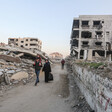The Electronic Intifada Podcast 23 July 2024
“It is a very painful experience that most doctors can’t comprehend.”
Jaber is an emergency physician in Gaza who worked at the Emirati maternity hospital before Israel invaded Rafah in May, and then worked at the European Gaza Hospital in Khan Younis until the Israeli army ordered the area to evacuate in early July.
He talks about the rapid spread of epidemics across Gaza, especially in shelters, where facilities and tent encampments are overcrowded and lack basic sanitation, infrastructure and medical services.
Before the genocide began in October 2023, Israel’s 17-year-long blockade had already pushed hospitals and the health care system to a breaking point.
Now, more than nine months into the war, hepatits A is rampant, Jaber says, and without access to treatment, it can quickly progress into acute liver failure.
“A lot of children [are] dying from hepatitis A, sadly. Those people need liver transplants, which is just not going to happen.”
He says that the basic medications that can slow the progression of liver failure are not available anymore.
“So a disease that is self-limiting and simple as hepatitis A became a nightmare for the people of Gaza,” he notes.
Last week, the Palestinian health ministry in Gaza announced that the virus that causes polio had been detected in sewage water samples in several locations.
Watch the entire episode above or listen via Soundcloud below.
Video production by Tamara Nassar
Subscribe to The Electronic Intifada Podcast on Apple Podcasts (search for The Electronic Intifada) and on Spotify. Support our podcast by rating us, sharing and leaving a review. You can also donate to fund our work.






Comments
Israel's inhumanity
Permalink Doris Wrench Eisler replied on
Israel's treatment of Gaza and its citizens and Palestinians on the left bank is inhuman, and unprecedentedly so: If there is a cogent argument against this view, I'd like to hear it.